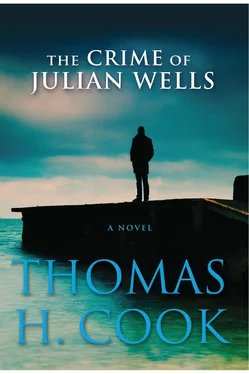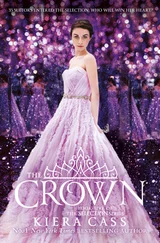Thomas Cook - The Crime of Julian Wells
Здесь есть возможность читать онлайн «Thomas Cook - The Crime of Julian Wells» весь текст электронной книги совершенно бесплатно (целиком полную версию без сокращений). В некоторых случаях можно слушать аудио, скачать через торрент в формате fb2 и присутствует краткое содержание. Год выпуска: 2012, ISBN: 2012, Издательство: Grove Press, Жанр: Криминальный детектив, на английском языке. Описание произведения, (предисловие) а так же отзывы посетителей доступны на портале библиотеки ЛибКат.
- Название:The Crime of Julian Wells
- Автор:
- Издательство:Grove Press
- Жанр:
- Год:2012
- ISBN:9780802194589
- Рейтинг книги:5 / 5. Голосов: 1
-
Избранное:Добавить в избранное
- Отзывы:
-
Ваша оценка:
- 100
- 1
- 2
- 3
- 4
- 5
The Crime of Julian Wells: краткое содержание, описание и аннотация
Предлагаем к чтению аннотацию, описание, краткое содержание или предисловие (зависит от того, что написал сам автор книги «The Crime of Julian Wells»). Если вы не нашли необходимую информацию о книге — напишите в комментариях, мы постараемся отыскать её.
The Crime of Julian Wells — читать онлайн бесплатно полную книгу (весь текст) целиком
Ниже представлен текст книги, разбитый по страницам. Система сохранения места последней прочитанной страницы, позволяет с удобством читать онлайн бесплатно книгу «The Crime of Julian Wells», без необходимости каждый раз заново искать на чём Вы остановились. Поставьте закладку, и сможете в любой момент перейти на страницу, на которой закончили чтение.
Интервал:
Закладка:
I thought of Julian and Marisol in a sun-drenched Buenos Aires. But now Marisol was less fixed in my mind, an identity that had been in continual revision, first as businesslike guide, then as spy, then as an Argentine version of La Meffraye, working either for the Montoneros or the junta, but equally evil in either capacity.
It was no doubt my continual reimagining of Marisol that took me back to a particular moment only a few days before I left Buenos Aires. It was my only time alone with her, and she seemed curiously preoccupied. It didn’t surprise me when she said, “There are days when one falls out of love with one’s life.”
“Months and years, if you’re not lucky,” I told her.
“Why do you say this?”
“Because it happened to my father. He regrets everything.”
“And you?”
“My regret is not with anything I’ve done,” I told her. “But sometimes I’m not altogether happy with what I am.”
“What makes you unhappy in this way?”
“Well, it’s mostly the fact that I don’t have any talent,” I answered. “I don’t sing or act or play a musical instrument. I’ve read the great books, but I couldn’t write even a bad one. Julian, on the other hand, has talent in great abundance.” Then, for the first time, I gave full voice to the truth. “I would like to be more like him.”
She glanced away, as if from a subject she didn’t want to discuss. “And what is Julian?”
I found that I had no answer for her, and this surprised me, the fact that I couldn’t pin Julian down, that something about him remained in flux, unsettled.
“He is very smart,” Marisol said, then looked out into the traffic. “This much is true.” She turned to face me. “But he is like his country. He isn’t finished yet. And in many ways, he is still a little boy.”
She added a quick smile to this last remark, so that it seemed not a criticism of “his country” but a curiously affectionate statement instead. For that reason, I let it pass and went on to another subject. But now, sitting at a breakfast table in Rostov, it returned to me insistently, and I related the exchange to Loretta.
“Still a little boy,” Loretta said. “You know what’s clear when a woman says that about a man? That she knows she’s superior to him.” She seemed briefly to consider Marisol with an added complexity she was still struggling to grasp. Finally she said, “Do you know the moment when Sherlock Holmes realizes that Irene Adler has seen through his disguise?”
I had never read Conan Doyle, so I said, “No, I don’t know any of those stories.”
“There is a moment when their eyes lock, Holmes and Irene Adler, and at that moment, the great detective knows, without doubt, that this one woman has fooled him.”
I imagined Julian in the shock of that recognition, coldly aware that he’d been played for a fool.
“You know,” I said, “if Julian ever found out that he was fooled by Marisol, fooled into believing that she was this innocent girl from the Chaco when she was something different, a spy, a torturer, a double agent, it would have wounded his self-confidence, his entire sense of himself.”
Loretta nodded. “Yes, it would have.”
“Would he have sought revenge?” I asked.
Loretta considered my question for a time before she spoke.
“You’ve stumbled upon another turn, you know,” she said. “The idea that when Julian was looking for Marisol, it wasn’t in order to find out what had happened to her or even who she really was.” Her gaze revealed something menacing. “Because he already knew.”
I immediately grasped where she was headed.
“And so he went looking for Marisol because he intended to. .,” I said, then stopped because I felt compelled to resist saying what had come into my mind.
I could have resisted it, almost on principle, but I would have had to ignore Loretta’s eyes, how very intense they were, filled with the sudden dread that rises when you sense that you are closing in upon a horrible truth.
“Because he intended to kill her,” I said. I felt a shudder. “Was that his crime?”
I saw Loretta entertain this possibility, then just as quickly reject it.
“But how could that have been Julian’s crime?” she asked. “Because he said that you witnessed his crime, remember?” She smiled at the wrong turn my latest conjecture had made. “Julian murder Marisol?” She smiled in utter confidence of the next thing she said. “Surely, Philip, you did not see that.”
24
Mikhail Soborov’s residence was more of a cottage than a house, and it was in an area that was mostly rural, a part of the Ukraine that had once blossomed with small, independent farmers, the famed kulaks that Stalin had so despised and all but exterminated through planned famine. Julian had made the point that Chikatilo was beaten for bedwetting and for almost every other offense, but the Great Famine was the traumatic event in the Rostov Ripper’s life; its tales of cruelty and cannibalism were ones to which the young Andrei responded not with horror or repulsion, but with a vicarious throb of pleasure and excitement that surely must have flooded his soul with dark surprise.
There was nothing at all surprising about Mikhail Soborov, however. In fact, he looked so much the way I expected that in a book he would have been a caricature of the boisterous, big-bellied Slav, hard-drinking and jolly, a Russian version of Falstaff.
“Thanks for talking to us,” I said as I took the hand he quite cheerfully offered.
The old man laughed robustly. “In old days, I would have hidden in the woodshed,” he said, “or had you killed en route.”
“In that case, I’m pleased that things have changed,” I said.
“Oh, yes, they have changed,” Soborov said with an air of jollity that now struck me as somewhat false, something other than Santa Claus underneath the bright red coat. “In those days my ideals were young, and a man takes on the look of the god he worships, is that not so?”
Rather than wait for me to answer, he turned swiftly to Loretta. “Now, here we have one who has not been aged by disenchantment,” he said as he took Loretta’s hand and gallantly kissed it. “Now, please. We shall have vodka, the three of us.”
But before reaching for the vodka, he cast a hard look at Yuri. “We don’t need extra set of ears,” he said sternly, and with that closed the door in his face.
When he turned back to us, he was frowning. “They say we are free now in Russia to say what we wish, but I do not trust such ‘guides’ as this one who comes here with you.”
“Why would they want an agent with us now?” I asked Soborov once we’d taken seats in his small living room.
“Because repression is a snake that grows back its head,” Mikhail answered in a way that clearly closed the subject. “So, what did Julian tell you about me?”
“Nothing at all,” I answered. “I learned about you from Irene, as I said in my letter.”
“Irene, yes,” Soborov said. “You know that in Budapest, during the war, she shot Jews in hospital beds, no?”
“My father hinted at something like that,” I answered. “And when we met her, she showed us a picture. It was quite sad. She feels-”
“Guilt, yes,” Soborov interrupted. “Julian once called it the false consolation of those not really harmed.”
“What an unforgiving thing to say,” I told him.
“For most, time wears guilt away, like wind and water,” Soborov said, “but perhaps time more forgiving than should be, yes?”
“Perhaps,” I said, since I could think of nothing else.
Soborov peered at me closely. “We never meet, you and I?”
“No,” I answered. “At least, I don’t think so.”
Читать дальшеИнтервал:
Закладка:
Похожие книги на «The Crime of Julian Wells»
Представляем Вашему вниманию похожие книги на «The Crime of Julian Wells» списком для выбора. Мы отобрали схожую по названию и смыслу литературу в надежде предоставить читателям больше вариантов отыскать новые, интересные, ещё непрочитанные произведения.
Обсуждение, отзывы о книге «The Crime of Julian Wells» и просто собственные мнения читателей. Оставьте ваши комментарии, напишите, что Вы думаете о произведении, его смысле или главных героях. Укажите что конкретно понравилось, а что нет, и почему Вы так считаете.












